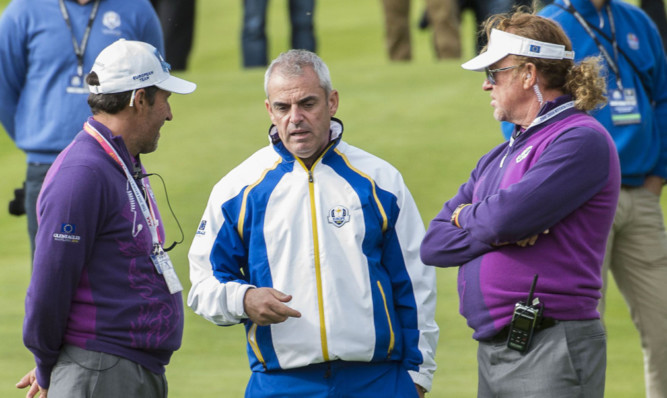It may not mean a thing after the first ball is struck in anger in 24 hours but the phoney war at the Ryder Cup would appear to belong to Europe and Paul McGinley.
It’s slightly hard to believe after Monday’s first press conference at Gleneagles which seems like an age ago already when the Irishman was largely upstaged by his forceful counterpart, US captain Tom Watson.
Sitting together then, McGinley clearly deferred to his boyhood hero, who, given his still-acute competitive spirit, was only too happy to take the lead.
By the third day, however, McGinley has maintained an even keel, and brazenly admitted that he hasn’t even looked to see what Watson’s practice pairings were.
He is confident and assured in his meticulous preparation, constantly referring to “the template” established by Tony Jacklin that ushered in Europe’s era of domination and has been enhanced and adjusted by Jacklin’s successors as team captain.
Watson, meanwhile, sitting on his own in the media centre, has looked ever more irritated with the modern requirements of Ryder Cup mania, specifically the constant media interviews. “I don’t have a lot to add to what I’ve been speaking about, honestly” was his rather exasperated opening gambit to yesterday’s daily press conference.
He remarked the media interest “and the time I have to spend with you ladies and gentlemen” was the biggest change since 1993, when he was last captain, the last American skipper to win on European soil.
It’s also the last time Tom Watson actually even attended any Ryder Cup until he arrived here this week.
Therein lies the irony of the two captains. The 65-year-old Watson was in part re-recruited because of his vast experience, a five-time winner as player and captain. But the man who is far more experienced in contemporary cup history is McGinley.
“I’ve been very lucky to be riding shotgun on this great ride of success we’ve had in Europe, three times as a player and twice as vice-captain,” said the Irishman. “I’ve learned so much from those experiences and every captain.
“There’s reasons why we have been winning these Ryder Cups. We’ve come from underdog positions so it’s not always been that we’ve had the best players.
“Medinah was a big learning curve for me. It’s the first I’ve been involved when we were behind the 8-ball. It was a horrible experience to be on the end of a walloping those first two days, but to observe Jose Maria (Olazabal) and sitting on his shoulder during that was a huge learning experience.
“If it happens again, I’m certainly better equipped to deal with it than I was before Medinah.”
McGinley, whether intentionally drawing the comparison or not, went on to relate his pride in his involvement, referring to Seve and Ollie, Monty, Jacklin, Lee and others in the great catalogue of influential Team Europe figures.
And while again making clear his respect for Watson, he admitted “in terms of what he’s been doing this week, I haven’t really paid any attention”.
“I have 12 guys, 12 caddies, five vice captains, a lot of people and a lot of information I’m processing,” he continued. “I don’t know what groups he’s been putting out there (in practice).
“I’m really concerned with us. If I start thinking about what’s going on over there, I’m going to lose focus on what I’m trying to achieve here.”
Watson obviously doesn’t think that it’s a disadvantage to have not been to the event in 21 years. “The only thing different is the media responsibilities, everything else is the same,” he said.
“I have watched the Ryder Cup every year, and I get the same feeling as I did when I played or captained, that same intensity.
“People want to share in this, participate, even the press who are supposed to be non-partisan. Everybody’s intense.”
In an attempt to introduce some “sobriety” to the team room, Watson introduced his players to two “wounded warriors” disabled ex-servicemen on Tuesday night, in a bit of a contrast to the banter going on the other side of the hotel where Sir Alex Ferguson was holding court with McGinley’s men.
“It did give perspective,” he said. “You look at those men and what they did and realise though we make this a big deal, it’s not a big deal.
“Hubert Green always used to say ‘I don’t know what I’d do if I had to work for a living’. This is a game. We don’t have deadlines. It was a special night and I think the players enjoyed the conversation.”
It’s not a new idea, Corey Pavin had a military theme to his captaincy in 2010. His team won three of four rain-reduced sessions at Celtic Manor, but still lost the cup.
